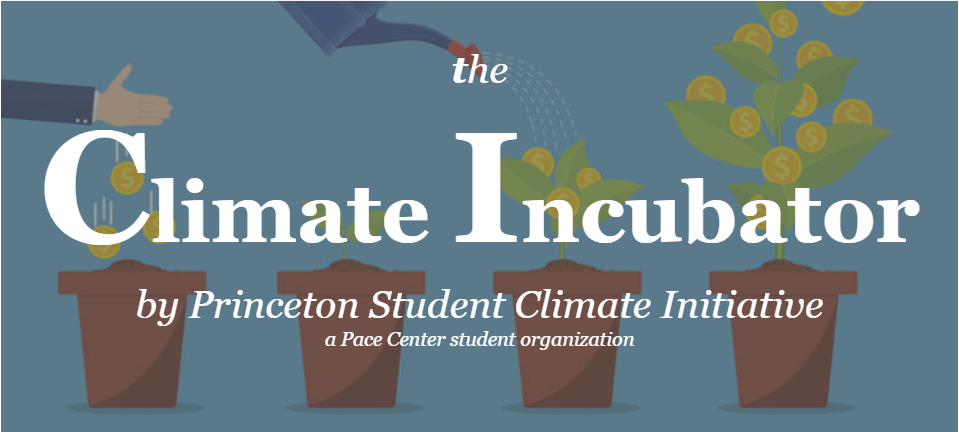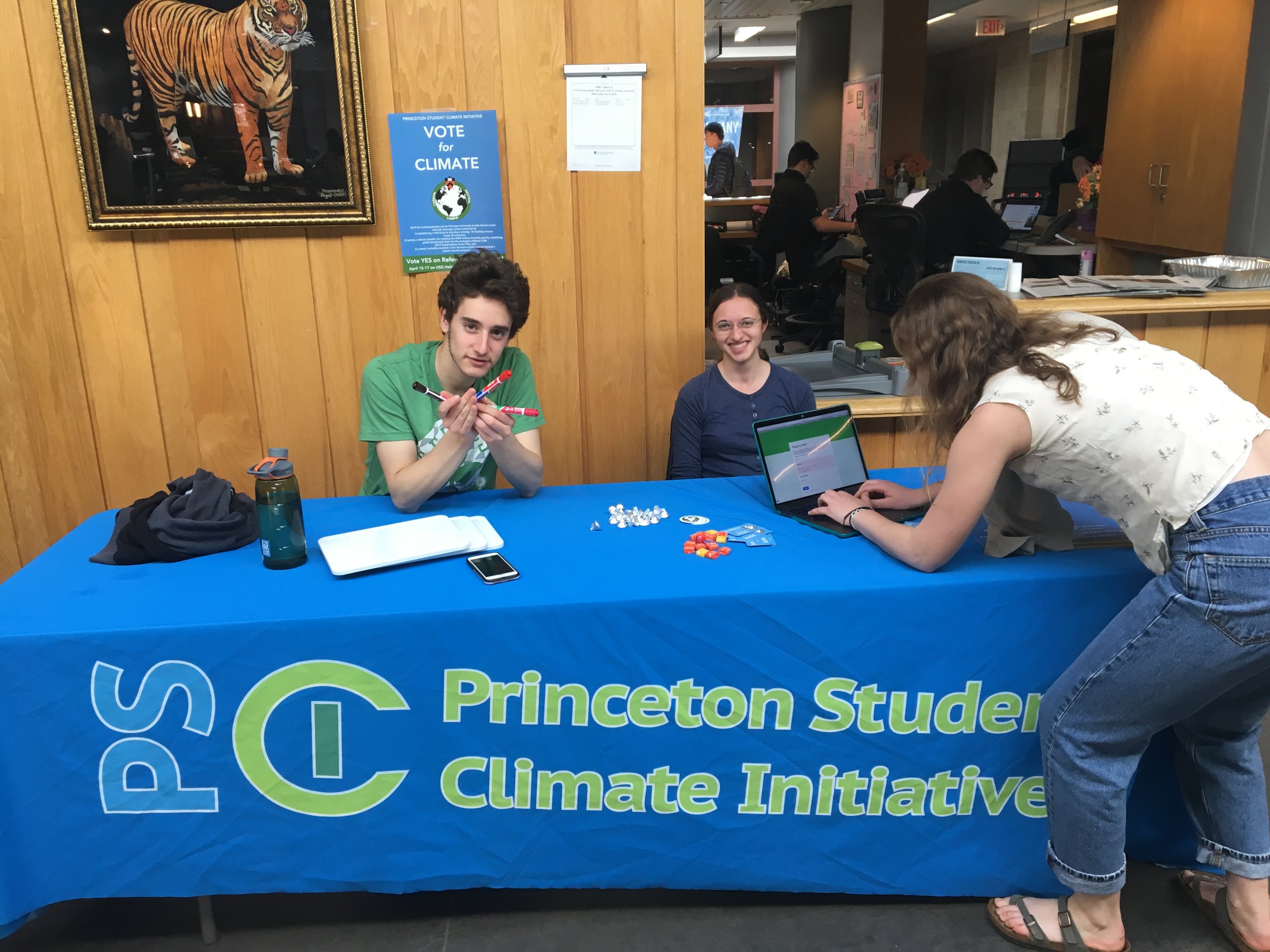Main Projects
PSCI runs on a project-based model, i.e., most of our members belong to one of the following projects. Take a look below to see which one you might want to join!
New Jersey Student Climate Advocates
The New Jersey Student Climate Advocates (NJSCA) is a team working on researching environmental justice policy and partnering with communities and driven by a mission to make space for justice in mainstream climate policy efforts. We are seeking individuals with interests in environmental/climate policy research and development, visual design and social media, communication, and/or community outreach, all guided by principles of environmental/climate justice.
We previously worked with members of the NJ state legislature to develop a carbon pricing policy proposal, 94-page policy research paper, and draft legislation.
If you are interested, please fill out our interest form here. We are continuing to meet during the COVID-19 pandemic. To learn more, please contact Frida Ruiz '25 at fridaruiz@princeton.edu. NJSCA wide meetings are Mondays from 8:30 - 9:00 PM ET; subteams will have additional meetings.
NJSCA website: https://njclimatepolicy.wixsite.com/njsca/our-message
Research Team
The Research Team investigates the most pressing issues facing the other PSCI sub-teams and help them obtain and analyze the necessary information to make informed decisions. In 2020, the team finished 20 articles on various mechanisms to combat climate change (https://psci.princeton.edu/tips), as well as miscellaneous projects for the New Jersey Student Climate Advocates and the Climate Incubator team. The Research Team investigates the most pressing issues facing the other PSCI sub-teams and help them obtain and analyze the necessary information to make informed decisions.
We meet every other Sunday from 2:30 to 3:00pm via Zoom. If you’d like to learn more, please contact Isadora Rivera-Janer at isadorar@princeton.edu.
CAPERS Team
The Climate Action Plan for Emission Reduction Strategies (CAPERS) team helps conduct environmental, financial and social cost-benefit analyses of various initiatives proposed in Princeton Township’s Climate Action Plan, which aims to bring the town’s net carbon emissions down by 80% by 2050. Our collective research features prominently in the final Plan itself, and our work has been covered in the Daily Princetonian, presented to the Princeton Sustainability Committee, and is featured on the Sustainable Princeton webpage.
Currently, this team of University students, high school students, and local sustainability professionals, has been involved in projects ranging from the electrification of lawn maintenance equipment to the collection of geospatial data on stormwater inlets using ArcGIS software.
If you would like to be involved, please contact Khiara Berkowitz-Sklar at khiarab@princeton.edu. We meet weekly for research updates from 5-6 PM on Tuesdays through Zoom.
PSCI Climate Incubator/Entrepreneurship Team
Just as climate-oriented legislation is a critical component of our fight against climate change and society’s efforts to hold individuals and corporations to sustainable practices, there are countless tech-enabled opportunities in the private sector to address climate change as well. Additionally, while the ability to enact impactful climate policy is a lengthy process -- both in terms of lawmaking and enforcement -- and is vulnerable to partisan shifts, the private sector can often bring about change much more quickly and forcefully when sustainable practices become market-competitive and in demand.
For this reason, PSCI created a Climate Incubator to support and grow early student ventures that target any aspect of environmental protection -- from resource utilization to energy to agriculture. The goal of PSCI’s Climate Incubator is to launch student-initiated startups that build a scalable solutions addressing climate change.
Currently, we are working with four student teams ranging from hydroponic farms to water turbines to photovoltaic fabrics -- helping them attain funding, conduct market and technical research, recruit students, access a network of experts, and iterate on their ideas. We are also helping to plan Princeton’s first climate-themed hackathon in partnership with Rehack!
To get involved, please contact Cataleya Jiang (ejjiang@princeton.edu).
Here are two of our PSCI Incubator teams:
The 10X Project (10xproject.org)
The 10X Project is a startup working to design and produce a small-scale hydroponic system for growing edible algae. Algae, a highly sustainable source of natural protein, has been proposed as a key “food of the future” due to its potential for use in fuel, nutrition, construction, and space-related industries. The goal of the project is to bring algae growing technology to a small-scale, countertop system that would allow for more people to have access to a healthier, fresher, and better-tasting protein source. They recognize that it will take effort to create a shift towards acceptance of this novel food, but the team believes an aesthetic, easy-to-use system will be a positive catalyst for change. They are currently working on their first prototype and the start of an online algae community!
Reclaim Energies (reclaim-energies.com)
Reclaim Energies is working hard to optimize the capture of untapped hydropower. Through a new spin on an old technology, they aim to create a more sustainable impact and to reclaim our future. Seeking to merge water waste with energy needs, Reclaim Energies strives to build out novel tech solutions to harness hydroelectric power and revolutionize the way in which society uses wastewater. Their turbine systems repurpose the wasted water flowing through the effluent pipes of these industries in order to generate renewable energy and as a result, will also be saving them approximately $60,000 a year. They are currently looking for funding to install their first prototype turbine!
New Jersey Student Sustainability Coalition
The New Jersey Student Sustainability Coalition (NJSSC) is a separate sustainability coalition from PSCI, and just collaborates with PSCI on specific projects. NJSCC is a youth-run network of college and high school students across the state of New Jersey. This network shares experience, resources, and expertise to build student power across the state, and push forward sustainability initiatives that benefit us all. Current projects include advocacy for the Clean Energy Equity Act, the Green Amendment, ecobricks, plastic waste reduction, and sustainable art in the place of activism. Join to meet other students across NJ with similar interests and learn about projects students across the state have been working on!
As an individual, PSCI members can join NJSSC and still connect with PSCI by sharing NJSSC events/resources with other teams in PSCI, or vice versa—share your personal projects and interests with other coalition members. To get involved, please contact Joyce Mo (jqmo@princeton.edu).
Previous Projects
Carbon Neutral Campus
The Carbon Neutral Campus campaign, launched in fall 2018, strives to minimize Princeton’s greenhouse gas emissions through advocacy and research. In April 2019, the group successfully passed a USG referendum, with 42% of undergraduates voting on it and 95% voting yes, that calls on Princeton to take more decisive climate action through tracking campus Scope III emissions, establishing a clearer timeline toward carbon neutrality by 2046, and increasing student engagement. We are currently working to implement the referendum as well as design other ways to reduce Princeton’s emissions further, such as a carbon footprint calculator for student-organized events.
This project is currently on hold during the COVID virtual semester.
Dinner Discussions
Given that climate change is such a complicated issue, PSCI has hosted dinner discussions with various guest speakers in order for students to understand the perspective of experts in the field. Not only do these conversations give us an opportunity to develop as climate policy advocators, but also a chance for anyone outside PSCI to learn more about some of the practical approaches and challenges to resolving climate change. Ultimately, the main goal of this project is to give attendees insight regarding an aspect of climate change that often goes unnoticed.
We have had the privilege of hearing several notable speakers, including public health expert Jessica Metcalf, who explained the effects of climate phenomena on the efficacy of healthcare systems and the spread of disease. Stephen Pacala, an ecology expert, spoke about the potential consequences of carbon pricing and other methods for carbon storage. Leading economist Marc Fleurbaey and international climate policy expert Michael Oppenheimer discussed different pricing systems for pollutants. Furthermore, we have collaborated with organizations such as the Princeton University Energy Association (PUEA) and the Minority Association of Pre-medical Students (MAPS) for hosting events.
If you want to hear a particular speaker or your organization would like to co-host an event with us, please contact Andrew Wu (aw38@princeton.edu). Also, feel free to join our listserv!
Campus Polls
In order to communicate effectively about climate change, it is important to understand the demographic that we are talking with, including what they do and do not know about, and what their various interests are.
To do this, PSCI has conducted a number of polls that were sent out to students at Princeton. The survey enlightened us about the various aspects of climate change that Princeton students wish to learn more about, as well as various attitudes towards climate science and policy.
Tabling
Tabling at Frist Campus Center is one of the primary ways by which we engage campus. We table on issues such as the diverse effects of climate change, the case for carbon pricing, and the threats posed by the local compressor station. These provide a great way to engage the rest of campus and build lifelong advocacy skills. Let us know if you are interested! Please contact one of our Vice Presidents, William Gu (wcgu@princeton.edu) or Richard Huang (rbhuang@princeton.edu) if you are interested. Also, feel free to join our listserv!
Public Talks
Everything You Need to Know About Climate Change in 30 Minutes
Climate change is an extremely important issue with significant political dimensions. However, the basis behind this issue is scientific at heart, and understanding the fundamentals behind this is an integral part towards coming up with feasible solutions to the problem. But, discourse on solutions to climate change can be difficult when people don’t know the evidence for and effects of climate change.
Everything You Need to Know About Climate Change in 30 minutes is our attempt to inform the general public about the science, policies, effects, and solutions for climate change. We discuss the evidence from ice cores, policies like the Kyoto Protocol and the Waxmen-Markey bill, and innovative solutions like reforestation and improved meat consumption.











